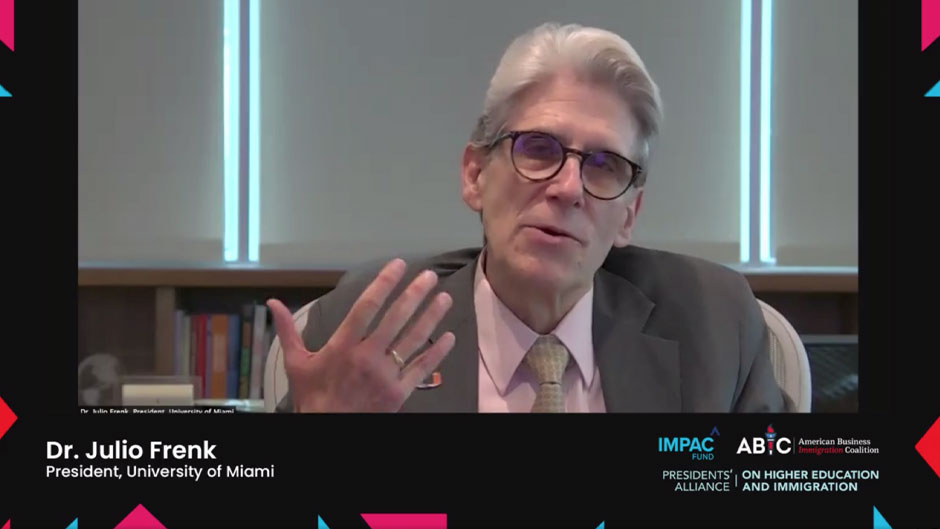When Idalia Quintero was finishing her last few years at Miami Senior High School, her teachers knew the undocumented immigrant from El Salvador showed incredible academic prowess, but Quintero felt powerless about her future because of her immigration status.
“While other classmates were applying for jobs and getting their driver’s licenses, I couldn’t do any of that,” she said.
With no social security number or state identification, Quintero also could not apply for financial aid to attend college. But with the help of her counselor, she learned about the Honors College at Miami Dade College, where she was able to receive a scholarship despite her legal status. This fall, she is transferring to Syracuse University on a full scholarship, yet Quintero is still unable to apply for United States citizenship.
This problem—faced by millions of undocumented youth in the U.S. who are called Dreamers—is why University of Miami President Julio Frenk, along with four other Florida college presidents, participated in a panel Tuesday organized by the Immigration Partnership and Coalition (or IMPAC) Fund, where they pledged their support for the Dream Act of 2021. It is a piece of legislation recently passed by the House of Representatives and is now in the hands of the Senate. If approved, the bill could provide a pathway to legal citizenship for undocumented children and young adults who have spent most of their lives in the U. S..
“Dreamers should be protected and offered the opportunity to become as American on paper as they are in practice,” said Frenk. “I am hopeful our conversation today sheds light on the amazing contributions of these resilient young people.”
It would be a major victory for a bill that was originally introduced in 2001. And after losing the votes needed to pass several times, a watered-down version, called Deferred Action for Childhood Arrivals (DACA), was passed in 2012 under the Obama administration. That legislation allows undocumented youth with a high school diploma or military service to gain work permits and to apply for federal financial aid for college in two-year increments. But DACA does not help these youth gain U.S. citizenship.
Frenk was joined on the panel by George L. Hanbury II, president of Nova Southeastern University (NSU); Gregory Adam Haile, president of Broward College; David A. Armstrong, president of St. Thomas University; and Jeffrey D. Senese, president of Saint Leo University in the Tampa Bay area. Most of the leaders touted programs at their institutions that offer scholarships to undocumented immigrants like Quintero, and they also stressed the many important perspectives that immigrants bring to higher education.
“What made America great is innovation and innovation comes about from diversity, with people looking through the same prism with different eyes and different perspectives,” said Hanbury. “We will only be able to continue to have that innovation in this country if we allow that diversity (i.e. Dreamers) to grow and be educated.”
The University of Miami created its own program for high school seniors with DACA status called the U Dreamers program in 2016. Since its inception, the program has expanded from a Miami-Dade County initiative to a statewide one that offers need-based financial aid to high school seniors and transfer students who often cannot apply for federal aid because of their immigration status. The first student graduated in May of 2020, and she is now headed to law school.
And an even larger group graduated this past May, said Iris Martinez, senior assistant director of undergraduate admission, who also oversees the program.
“About 80 percent of the students in the U Dreamers program receive merit scholarships to attend UM, so these are highly competitive academic students,” Martinez added.
Haile, who worked on legislation that paved the way for Florida to offer in-state tuition to Dreamers in 2014, said that it makes economic sense for the U.S. to allow immigrants to thrive.
Armstrong agreed. “We need to end the political football,” he said. “These people are in these situations through no fault of their own. They are productive Americans, and through a technicality they don’t have that designation of U.S. citizen. So, it’s time to sign the 2021 Dream Act. It’s the right thing to do.”
According to Frenk, allowing Dreamers to become citizens could even help South Florida rebound from the economic downfall of the pandemic. “This is truly a pivotal moment, and we cannot afford to lose talent,” Frenk said. “And passing legislation like the Dream Act is not an act of charity; it is enlightened self-interest. Dreamers have incredible potential, and the time to give them the security of full status—of allowing them to fully belong—is now.”
Visit the IMPAC Fund’s Facebook page to watch a recording of the panel discussion.

